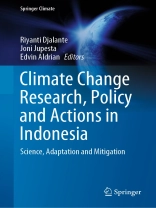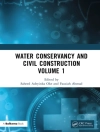This edited volume reviews the latest advances in policies and actions in understanding the science, impacts and management of climate change in Indonesia.
Indonesia is one of the most vulnerable countries to climate change due to its geographical, physical, and social-economic situations. There are many initiatives to understand and deal with the impacts in the country. The national government has issued key guiding policies for climate change. International agencies together with local stakeholders are working on strengthening the capacity in the policy formulations and implement actions to build community resilience. Universities are conducting research on climate change related at different scales. Cities and local governments are implementing innovations in adapting to the impacts of climate change and transiting toward green economy. This book summarizes and discusses the state-of-the-art regarding climate change in Indonesia including adaptation and mitigation measures.
The primary readership of the book includes policy makers, scientists and practitioners of climate change actions in Indonesia and other countries facing similar challenges.
Chapter “Carbon Stocks from Peat Swamp Forest and Oil Palm Plantation in Central Kalimantan, Indonesia” is available open access under a Creative Commons Attribution 4.0 International License via link.springer.com.
Innehållsförteckning
Foreword.- Preface.- Introduction.- Part 1 Introduction / Overview.- Part 2 Climate change adaptation.- Part 3. Climate change mitigation.- Glossary.
Om författaren
Dr. Riyanti Djalante has had several positions related to disaster risk reduction (DRR) and climate change adaptation (CCA) research and policy. She is an Academic Programme Officer at UNU-IAS. She coordinates the Research and Policy Development stream on Global Change and Resilience, which conduct researches to address climate change, build community resilience, and reduce disaster risks. Her current appointments include a member of the Scientific Committee of the IRDR, fellow of the Earth System Governance Network, Fellow of the International Social Science Council (ISSC). She is the Lead Author of
IPCC Assessment Report 6 and
Special Report on impacts of 1.5 degree warming, and the
Global Environmental Outlook 6 of the UN Environment. She is also the editor of the
Journal of Sustainable Science of Springer.
Dr. Joni Jupesta works as Senior Researcher at the Research Institute of Sinar Mas Agribusiness and Food(SMARTRI). An Indonesian citizen, he graduated his Ph.D. in Management Science and Technology from Tohoku University in Sendai, Japan. His works are focusing on the environmental impact assessment across sectoral agriculture, food and energy. He received several accolades for his scientific work, among others: Green Talent Award in 2012 from German Federal Ministry of Education and Research (BMBF), Mitra Award in 2013 from Asia Pacific Network on Global Change Research (APN-GCR), and Life Cycle thinking Approach (LCA) Award in 2017 from the United Nations Environment Programme (UNEP). In 2018 he was selected as Lead Author for Working Group III to prepare the Intergovernmental Panel for Climate Change (IPCC) 6th Assessment Report.
Prof. Edvin Aldrian works for the Agency for Assessment and Application of Technology (BPPT), Jakarta, Indonesia. He is the IPCC Working Group I Vice Chair.












